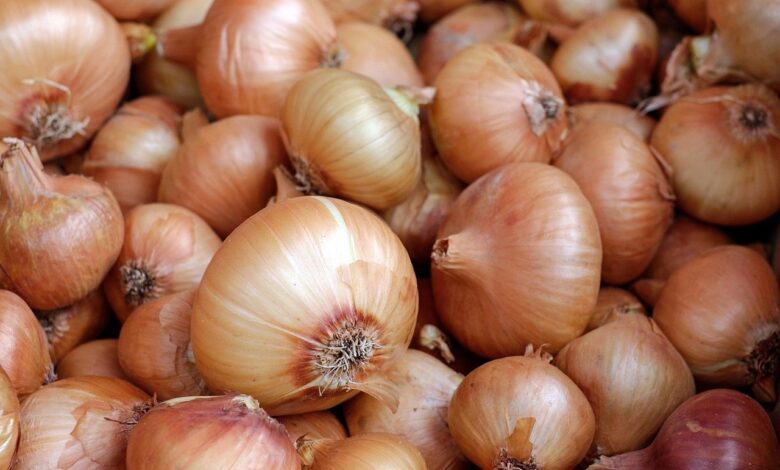Government Takes Aggressive Measures to Ensure Affordable Onion Prices for Consumers

In a proactive move to combat rising onion prices and protect consumers from the recent surge in costs due to delayed kharif crop arrivals, the Indian government has initiated an aggressive retail sale of onions at a subsidized price of Rs. 25 per kg. This initiative is part of a comprehensive strategy to make onions more accessible and affordable to domestic consumers.
To alleviate the situation, the Department of Consumer Affairs has procured a substantial amount of onions, amounting to 5.06 Lakh Metric Tons (LMT), which will be made available through e-sales, e-Nam auctions, and bulk sales. This effort is complemented by various other measures aimed at ensuring onion availability, such as the imposition of a Minimum Export Price (MEP) of USD 800 per Metric Ton (MT) starting from October 29, 2023. Additionally, the government has enhanced buffer procurement by an additional 2 Lakh tons, supplementing the 5.06 Lakh tons already procured. The continuous disposal of onions through retail sales, e-Nam auctions, and bulk sales in wholesale markets has been ongoing since the second week of August.
Retail outlets and mobile vans operated by the National Cooperative Consumers’ Federation (NCCF), the National Agricultural Cooperative Marketing Federation of India Ltd. (NAFED), Kendriya Bhandar, and state-controlled cooperatives are now distributing onions to consumers at the subsidized rate of Rs. 25 per kg. As of November 2, NAFED has established 329 retail points in 55 cities across 21 states, including stationary outlets and mobile vans. Similarly, NCCF has set up 457 retail points in 54 cities spanning 20 states. Kendriya Bhandar has also commenced retail onion sales in Delhi-NCR from November 3, 2023, with Safal Mother Dairy scheduled to follow suit this weekend. In Telangana and other southern states, the Hyderabad Agricultural Cooperatives Association (HACA) is responsible for distributing onions to consumers.
To manage seasonal price fluctuations between rabi and kharif crops, the government maintains an onion buffer by procuring rabi onions for calibrated and targeted release. This year, the buffer size has been raised to 7 LMT from 2.5 LMT in 2022-23. To date, 5.06 LMT of onions have been procured, with the procurement of the remaining 2 LMT currently in progress.
The government’s proactive efforts are yielding results, with onion prices at the Lasalgaon market declining from Rs. 4,800 per quintal on October 28, 2023, to Rs. 3,650 per quintal on November 3, 2023, representing a 24% drop. Retail prices are expected to follow suit and decrease in the coming week.
The government’s intervention mirrors its successful approach to managing tomato prices earlier this year when supply disruptions caused by monsoon rains and white fly infestation led to price spikes. Tomatoes were procured from producing states, including Karnataka, Andhra Pradesh, and Maharashtra, and sold at highly subsidized rates to consumers, ultimately reducing retail prices from Rs. 140 per kg to around Rs. 40 per kg.
In addition to addressing onion prices, the government has also launched the “Bharat Dal” initiative to ensure the availability and affordability of pulses, a crucial source of nutrition for Indian households. Bharat Dal is being offered at subsidized prices, with a 1 kg pack priced at Rs. 60 and a 30 kg pack at Rs. 55. This initiative makes Bharat Dal available for retail sale to consumers and for supplies to the Army, CAPF, and welfare schemes through NAFED, NCCF, Kendriya Bhandar, Safal, and state-controlled cooperatives in Telangana and Maharashtra.
Thus far, 3.2 LMT of Chana stock has been allocated for conversion, with 75,269 MT milled and 59,183 MT distributed through 3,010 retail points across 282 cities. The supply of Bharat Dal will be further increased to ensure over 4 lakh tons of Bharat Dal are available to consumers across the country in the near future.




